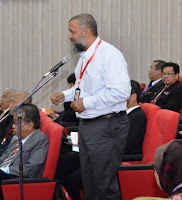
Briefing given by Dr. Sazali Yusoff, the conference secretary prior to the opening ceremony.
Opening Ceremony officiated by Dato' Asariah Meor Shaharuddin, Deputy Director-General of Education Malaysia (5 July 2011)
Tan Sri Dato' Dr. Wan Mohd Zahid bin Mohd Noordin.
Chairman, University of Technology MARA, Malaysia.
(5 July 2011).
Keynote Speaker :
He discussed deeply on the challenges faced by educational leaders particularly on transforming schools from the worst to the best.
Assoc. Prof. Dr. Boonsom Siribumrungsukha.
President, Prince of Songkla University, Thailand.
(6 July 2011)
Keynote Speaker :
He discussed on the promises and challenges in building effective educational leaders in tandem with producing humane graduates for the benefit of mankind.
Prof. Datuk Dr. Ibrahim Bajunid
Deputy President/Deputy Vice-Chancellor
INTI University College
Malaysia
(7 July 2011)
Keynote Address:
He touched on several aspects of unjust actions in educational management, and provocatively challenge the just leaders and courageous colleagues to correct the dilemma.

Q & A Session :
Prof. Dr. Mohammad Fawzi.
Qatar University,
Qatar
Q & A session :
Dr. Abood Al-Sawafi
Vice-Chancellor
Sohar University
Oman
Q & A session :
Emeritus Prof. Dr. Ashok Rathore,
Sam Higginbottom Institute of Agriculture, Technology & Sciences,
India

Paper Presentation :
Dr.Mohammed Nasser Al Suwayyd,
University of Al-Majjmaah,
Saudi Arabia
Paper 's Title : Teamwork
A token of gift to presenter from Palestine, Mr. Alaedin Khalil Alsayed by Mr. Zamri Abu Bakar, Head of Department, IAB.
Paper's title :
“Leadership Style, Job Performance, and Leadership Outcomes in Palestinian Ministry of Education”
Presenter from Indonesia, Hasmirati Bakkaring.
Paper's title :
Model Sekolah Berprestasi Tinggi Di Kota Makassar (High Performing School Model in Makassar City)
Dr. Suzumura Yusuke from Hosei University, Japan.
Paper's Title :
“Influence of Education on Democratic System: Focusing on “More Relaxed Education” in Japan”
Prof. Dr. Mohd Johdi Salleh, International Islamic University of Malaysia.
Paper's title :
"Principals Best Practice to Conflict Management at the Excellent Secondary Schools, Malaysia”

Special meeting with international participants to explore the possibilities of networking and collaboration in the field of research, publication and faculty exchange.

A very brief chat with Dr. Amin Senin, Director of IAB.

The Deputy President of Malaysian Headmasters' Council giving his opinion during Q & A in the parallel presentation.
Participants did not want to miss to have photo with Prof. Datuk Dr. Ibrahim Bajunid, a renowned management scholar in this region

The first recipient of RCELAM "Roll of Honour" award, Dato' Asariah Meor Shaharuddin.

Side event : School exhibition

IAB Northern Branch choir group
Participants from Iran, Pakistan, South Africa, Maldives, Brunei, Oman, Qatar, ...
Invited guests during the closing ceremony.

Registration of participants in progress.
Opening ceremony (L-R) : Mr. Khailani, President of Malaysian School Principals' Council; Dr. Jamil Adimin, Deputy Director of IAB; Dato' Asariah Meor Shaharuddin, Deputy Director-General of Education Malaysia; Mr. Mohd Idris Mahmud, Branch Director of IAB Northern Branch; Mr. Ruslan Madun, President of Malaysian Headmasters' Council.
Welcoming the delegate from Ministry of Education, Saudi Arabia - Dr. Mohamad Abdullah






































